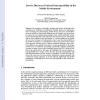Free Online Productivity Tools
i2Speak
i2Symbol
i2OCR
iTex2Img
iWeb2Print
iWeb2Shot
i2Type
iPdf2Split
iPdf2Merge
i2Bopomofo
i2Arabic
i2Style
i2Image
i2PDF
iLatex2Rtf
Sci2ools
124
click to vote
SEM
2004
Springer
2004
Springer
Service Discovery Protocol Interoperability in the Mobile Environment
The emergence of portable computers and wireless technologies has introduced new challenges for middleware. Mobility brings new requirements and is becoming a key characteristic. Mobile devices may move around different areas and have to interact with different types of networks, services and may be exposed to new communication paradigms. Thus, mobile distributed systems need to dynamically detect and adapt their interaction protocols to interoperate with services available in the environment. As a result, middleware for mobile devices must overcome two heterogeneity issues to provide interoperability in the mobile environment, i.e, heterogeneity of discovery protocols and of interaction protocols between services. Whereas adaptation techniques from reflective middleware are suitable for the latter, it is more problematic for the former if both issues are addressed concurrently. Specifically, reflective mechanisms consume too many resources like bandwidth, memory and CPU, which are lim...
Related Content
| Added | 02 Jul 2010 |
| Updated | 02 Jul 2010 |
| Type | Conference |
| Year | 2004 |
| Where | SEM |
| Authors | Yérom-David Bromberg, Valérie Issarny |
Comments (0)

